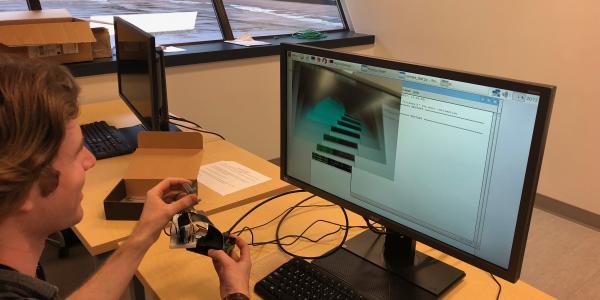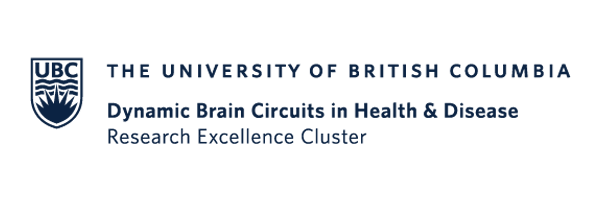
The Dynamic Brain Circuits Cluster hosts an introductory training course for MatLab and hosts online training courses for some other programming languages. For more info write us at brain.circuits@ubc.ca
Slack
The Dynamic Brain Circuits Cluster Slack page is always being updated with information on upcoming workshops and training courses. If you would like to stay up to date with the training opportunities offered by the cluster, then we highly recommend joining the channel. Please email jeffrey.ledue@ubc.ca to be added to the Slack channel.
Microcourses
Microcourses are short videos on a variety of light microscopy topics. They are presented by a team of microscopists from Harvard Medical School and are available here.
Onboarding Portfolio
The UBC Brain Circuits Cluster onboarding portfolio is intended to introduce new cluster members and neuroscience graduate students to tools and resources that they may need as they begin their research at UBC. The portfolio is designed as a quick start guide and is therefore recommended as a reference for unfamiliar things that new members may encounter or new skills they may need to acquire.
Most of what is presented is central to neuroscience research and the portfolio encourages the use of free online resources that are catered directly to the needs of neuroscientists.
Major topics include Introduction to Coding, MATLAB, Python, Jupyter, statistics, data management, and image analysis.
Dynamic Brain Circuits Introductory Courses.
The Dynamic Brain Circuits Cluster hosts a variety of introductory programming courses, including courses on R, MatLab, and Python. For more information, please click here.
Basic Programming Principles
A solid understanding of basic programming principles is an essential way to start before approaching any language. If you have very limited or no prior programming experience, we recommend reading this excellent introduction article here.
If you’re interested in a more in-depth introduction to programming concepts, there is an excellent FREE online course offered by Pluralsight here.
Hacker.io reached out to us to suggest their website as a resource for programming classes. The website is impressively comprehensive as a compendium of classes and courses for MANY different subjects. If you’re looking for something specific, this is a good place to search. Be aware that many of the courses are NOT free, but it’s still definitely worth a look. Check out more here.
MATLAB
Where to get MATLAB for UBC students
Information on downloading and installing Matlab under the UBC site license is available here.
Online MATLAB Training Resources
Approved Online training resources for Matlab we have reviewed:
If you have a Mathworks account, the Matlab Onramp Series is a great beginning introduction: Matlab Onramp
Screen Videos from an older version of MatLab, but a very comprehensive introduction to the core operating functions
The Mathworks in house intro to Matlab Materials
A good (but brief) online intro to MatLab matrix operations in one place
Introduction to signal processing in MATLAB
Python
Where To Get Python
Python is freely available software and can be downloaded from multiple sources. We recommend the following sources:
Python.org: The official Python site, has the latest updates. This is the most basic implementation of Python.
Anaconda: Anaconda offers a Python IDE with integrated packages for Data Science and is a more robust and well-rounded ready to use implementation. This version may be both easier to use and more complex for an early user.
Online Python Training Resources
Python.org: has a lot of resources from beginner’s guides to coding in python to advanced user suggestions and a comprehensive guide to keywords and functions.
For a basic introduction to Python syntax and programming, you can find the Allen Brain Institute’s Python Bootcamp code here. Note, the code should ideally be run in a Jupyter Notepad, more info on how to set up Jupyter is here.
R
Where To Get R
R is freely available Software, but we recommend downloading the open-source edition Rstudio package here
Rstudio offers a full IDE (programming environment) for R and many useful packages to make the experience of working with R easier.
Tidyverse: We also recommend looking into the Tidyverse packages. Tidyverse is a collection of well-thought-out packages to encourage and accomplish best practices for data management and analysis for working in R. Also, the Tidyverse website has a link to the online book R for Data Science.
Online R Training Resources
R for Data Sciences mentioned above is a good introduction to working with R for analysis purposes, but also a good introduction to a proper data analysis workflow in general.
Introduction to Neurohacking in R
Research Computing Bootcamp
UBC Advanced Research Computing (ARC) hosted a three-day Research Computing Bootcamp from Monday, July 12 – to Wednesday, July 14, 2021. The training session included tutorials on Linux and the command line, using High Performace Computing clusters (HPCs), and cloud computing and virtual machines. The course also included an interactive tutorial on using Sockeye and Chinook which are HPCs provided by ARC to UBC researchers. The materials from this event are an excellent resource for anyone who plans to use high-performance computing cluster services such as Compute Canada and ARC.
All of the materials from the Bootcamp including lecture recordings and slides can be found here.
For more information on the services provided by UBC ARC, please see the UBC ARC website.
Neuromatch Academy
Neuromatch is a not-for-profit organization in the United States that hopes to offer learning, networking, and mentorship opportunities to the computational neuroscience community. In 2020, Neuromatch started hosting a computational neuroscience course called Neuromatch Academy. The aim of Neuromatch Academy is to educate trainees on computational neuroscience tools by bridging computational methods with modern neuroscience concepts. The program includes both interactive and observer formats and covers a variety of subjects including Python, Machine learning, Real Neurons, and Dynamic Networks.
For more information and to see how you can attend Neuromatch Academy, please see the Neuromatch Academy website.
All of the materials from previous Neuromatch Academy courses can be found here.
Image Processing
MaxBi tutorials: The MaxBi Tutorials are short sessions on image acquisition and processing techniques as well as sharing experiences on maintenance organized by Max Planck facilities for Max Planck facilities.
From Images to Knowledge with ImageJ and Friends was a virtual workshop that focused on in-depth interactive tutorials covering state-of-the-art open source solutions for biological-image reconstruction and analysis. The workshop concluded in November of 2020 but you can find many recordings of the tutorials on their website.
Machine Learning & Interactive Image Processing with Dash: With its flexible Python framework, Dash is the platform of choice for machine learning scientists wanting to build deep learning models. This 1-hour webinar will demonstrate how to use image annotations and machine learning in Dash for interactive image processing.
Machine Learning and Artificial Intelligence
AI for Medicine Specialization: This three-course specialization attempts to give students practical experience in applying machine learning to concrete problems in medicine.
Machine Learning: A comprehensive online course on machine learning provided by Stanford university.
Minicourse on First-Order Optimization Algorithms for Machine Learning
CPSC 340 and 542M: A UBC course on machine learning and data mining that the Dynamic Brain Circuits Cluster recommends.
Other Online Courses
Principles of fMRI 1 and Principles of fMRI 2 offered by Johns Hopkins University through Coursera.
AI for Medicine Specialization
Computational Neuroscience: Neuronal Dynamics of Cognition
Suggestions?
If you would like to suggest any online resources, we’re always open to recommendations on the best online training courses. What worked for you? What has not worked for you? Let us know at brain.circuits@ubc.ca

